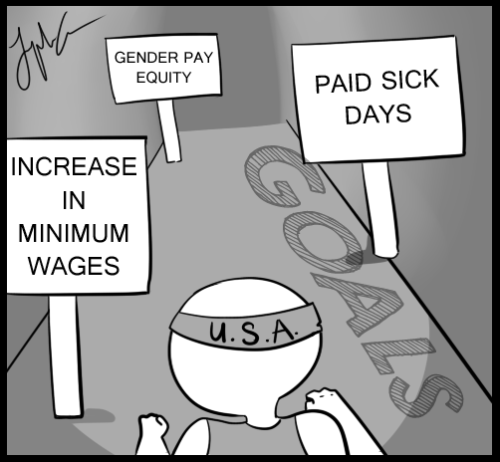U.S. Playing Catch-Up for Working Americans

ELTON HO
Copy Editor
In his 2015 State of the Union address, Obama outlined some key goals of workplace reform for the year: a minimum wage increase, mandatory paid sick leave and gender pay equity. While reforms may find difficulty passing through the Republican-majority House and Senate, Obama’s goals would be beneficial for most Americans and would allow the nation to keep up with other progressive countries.
In 2013, 3.3 million workers were paid at or below the current federal minimum wage of $7.25 per hour, according to the U.S. Bureau of Labor Statistics. This amount would fail to support most people. A full-time minimum-wage worker earns an annual income of $15,080, already below the poverty line of a 2-person household before taxes, according to the U.S. Department of Health and Human Services. Evidently, a minimum wage increase is necessary, not to unfairly redistribute wealth as some claim, but to allow an adequate standard of living for all workers.
Students are familiar with the inconvenient choice of either attending school while miserably sick or resting at home and making up days of work. However, this can become a more drastic dilemma for workers when it becomes a choice between health and pay. The Center for Economic and Policy Research has found that out of 22 comparatively wealthy countries, the U.S. is the only one that would not provide any worker’s compensation for either a 5-day flu or a 50-day cancer treatment. A bill that guarantees seven paid sick days a year, as Obama proposed, would be a simple step in the right direction.
Moreover, as if U.S. worker’s rights could not lag behind other countries enough, the U.S. ranks last in government support for new parents when compared to 37 other countries, according to the Organization for Economic Cooperation and Development. While the Family and Medical Leave Act allows certain eligible employees to receive up to 12 weeks of unpaid leave in a 12-month period to care for a child, all workers should be able to enjoy these benefits, plus at least some financial compensation.
Perhaps most importantly, the U.S. must address the issue of gender pay inequity. Data from the Bureau of Labor Statistics have long shown that women make less than men in every occupation. The pay gap has not changed in a decade, and will not change until action is taken. One would think that gender equality would be a nonpartisan issue by now, but in September 2014, Senate Republicans inexplicably blocked the Paycheck Fairness Act, according to the Huffington Post.
With several important reforms on the table, hopefully 2015 can be a year of government cooperation in addressing these priorities.